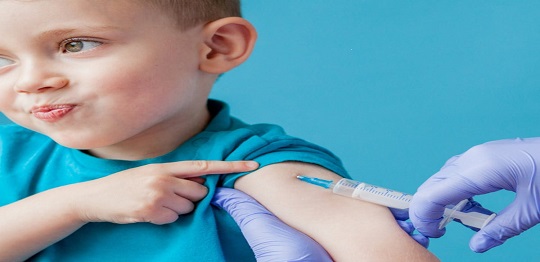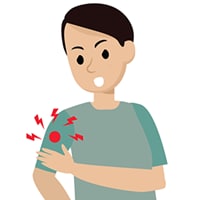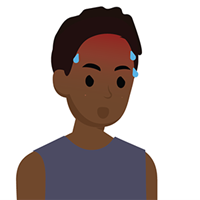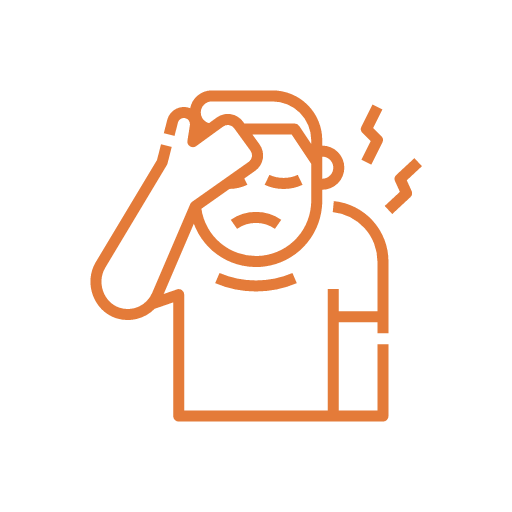Coronavirus (COVID-19)
Helping you stay healthy, aware, and informed

Children COVID-19 Vaccination – Questions & Answers
Help Protect Your Child, Your Family, and Others
Why Children and Teens Should Get Vaccinated for COVID-19
Getting a COVID-19 vaccine can help protect children ages 5 years and older from getting COVID-19.
- Vaccinating children can help protect family members, including siblings who are not eligible for vaccination and family members who may be at increased risk of getting very sick if they are infected.
- Vaccination can also help keep children from getting seriously sick even if they do get COVID-19.
- Vaccinating children ages 5 years and older can help keep them in school and help them safely participate in sports, playdates, and other group activities.
- Help protect your whole family and slow the spread of COVID-19 in your community by getting yourself and your children ages 5 years and older vaccinated against COVID-19.
Although children are at a lower risk of becoming severely ill with COVID-19 compared with adults, children can:
- Be infected with the virus that causes COVID-19
- Get very sick from COVID-19
- Have both short and long-term health complications from COVID-19
- Spread COVID-19 to others
Children with underlying medical conditions are more at risk for severe illness from COVID-19 compared with children without underlying medical conditions. Children who get infected with the virus that causes COVID-19 can also develop serious complications like multisystem inflammatory syndrome (MIS-C)—a condition where different body parts become inflamed, including the heart, lungs, kidneys, brain, skin, eyes, or gastrointestinal organs.
After Your Child’s COVID-19 Vaccination (Possible side effects)
Your child may have some side effects, which are normal signs that their body is building protection.

- Pain
- Redness
- Swelling

- Tiredness
- Headache
- Muscle pain
- Chills
- Fever
- Nausea
These side effects may affect your child’s ability to do daily activities, but they should go away in a few days. Some people have no side effects and severe allergic reactions are rare. If your child experiences a severe allergic reaction after getting a COVID-19 vaccine, vaccine providers can rapidly provide care and call for emergency medical services, if needed.
Ask your child’s healthcare provider for advice on using a non-aspirin pain reliever and other steps you can take at home after your child gets vaccinated. In general, aspirin is not recommended for use in children and adolescents less than 18 years of age. Placing a cool, damp cloth on the injection site can help with discomfort.
COVID-19 Vaccine Dosage and Administration for Children and Teens
The pediatric vaccine already is being shipped around the country. Vaccine providers must use the pediatric vaccine formulation with orange caps and labels. Children ages 5-11 years will be vaccinated with two 10-microgram doses administered 21 days apart. The dosage is one-third of the adolescent and adult dose.
Dosages are determined by age, not a child’s size or weight. Some children may be 11 years old when they get their first dose and 12 at the time o their second dose. They should receive a dose based on their age on the day of vaccination, according to the CDC.
The COVID-19 vaccine can be given at the same time as other routine vaccines but should be done in a different injection site. The CDC and AAP also recommend children with prior COVID-19 infection get vaccinated. This includes children who have a history of multisystem inflammatory syndrome in children (MIS-C) if they meet several criteria including clinical recovery, at least 90 days have passed since their diagnosis, onset of MIS-C occurred before COVID-19 vaccination and they are in an area of high or substantial community transmission or otherwise have increased risk for exposure to the virus. Even if they don’t meet all the criteria post-MIS-C, the CDC said vaccination may be considered.
Vaccine trial date on efficacy & safety
Clinical trial in children ages 5-11 years found the vaccine to be 90.7% effective in preventing symptomatic COVID-19. The vaccine also met immunobridging success criteria for geometric mean neutralizing antibody titers and seroresponse rates.
Safety data from the trial which included more than 3,000 children who received the vaccine, found the most common reactions were pain at the injection site, fatigue and headache. Reactions were mostly mild or moderate. There were no serious adverse events related to the vaccine, including anaphylaxis or myocarditis, although the latter likely was too rare for detection in a trial of that size.
The occasional cases of myocarditis that have been reported after an mRNA COVID-19 vaccine have been predominantly in males ages 12-29 years. The CDC noted baseline rates unrelated to the vaccination are much lower in children ages 5-11 than in older children, so the same may be true of vaccine-associated cases. Studies also have found the risk of myocarditis is greater from COVID-19 infection than from vaccination.
“I think the data supports that we have one more vaccine that saves lives of children and that we should be very confident to employ it to the maximum to do what is meant to do without significant concerns of serious adverse events,: said ACIP member Sarah S. Long, M.D., FAAP, professor of pediatrics at Drexel University College of Medicine.
Many members said their adolescent and adult family members have been vaccinated and if they had children or grandchildren in this age group, they would not hesitate to get them vaccinated.
Due to COVID-19, we are seeing a higher than normal demand for our services. We ask that you remain patient as we do our best to accommodate the healthcare needs of the community during this difficult time. Please know that our staff remains committed to meeting your needs as quickly and completely as possible.
Please visit our Facebook page for regular updates on what we’re battling COVID-19, and how you can support us in our effort.
Be aware and informed
Educating yourself about Covid-19 is your first defense agains the virus. Click through the sections below to learn more about how you can keep your family healthy and safe.

Signs and symptoms of COVID-19
People with COVID-19 have had a wide range of symptoms reported – ranging from mild symptoms to severe illness. Symptoms may appear 2-14 days after exposure to the virus. People with these symptoms listed below may have COVID-19.
- Fever or chills
- Cough
- Shortness of breath or difficulty breathing
- Fatigue
- Muscle or body aches
- Headache
- New loss of taste or smell
- Sore throat
- Congestion or runny nose
- Nausea or vomiting
- Diarrhea

Should I be tested for COVID-19?

What should I do if I am sick?
If you are sick with Covid-19 or think you might have Covid-19, follow the steps below to care for yourself and to help protect other people in your home and community.
- Stay home except to get medical care
- Separate yourself from other people
- Monitor your symptoms
- Call ahead before visiting your doctor
- Wear a cloth covering over your nose and mouth
- Cover your coughs and sneezes
- Clean your hands often
- Avoid sharing personal household items
- Clean all “high-touch” surfaces everyday
Visit the CDC website for more guidance on what to do if you are sick with Covid-19

Frequently Asked Questions
What is a novel coronavirus?
A novel coronavirus is a new coronavirus that has not been previously identified. The virus causing coronavirus disease 2019 (COVID-19), is not the same as the coronaviruses that commonly circulate among humans and cause mild illness, like the common cold.
How does the virus spread?
The virus that causes COVID-19 is thought to spread mainly from person to person, mainly through respiratory droplets produced when an infected person coughs, sneezes, or talks. These droplets can land in the mouths or noses of people who are nearby or possibly be inhaled into the lungs. Spread is more likely when people are in close contact with one another (within about 6 feet). COVID-19 seems to be spreading easily and sustainably in the community (“community spread”) in many affected geographic areas. Community spread means people have been infected with the virus in an area, including some who are not sure how or where they became infected.
How can I protect my child from COVID-19 infection?
You can encourage your child to help stop the spread of COVID-19 by teaching them to do the same things everyone should do to stay healthy.
- Avoid close contact with people who are sick.
- Stay home when you are sick, except to get medical care.
- Cover your coughs and sneezes with a tissue and throw the tissue in the trash.
- Wash your hands often with soap and water for at least 20 seconds.
- If soap and water are not readily available, use an alcohol-based hand sanitizer with at least 60% alcohol.
- Clean and disinfect frequently touched surfaces and objects, like tables, countertops, light switches, doorknobs, and cabinet handles).
Who is at higher risk for serious illness from COVID-19?
COVID-19 is a new disease and there is limited information regarding risk factors for severe disease. Based on currently available information and clinical expertise, older adults and people with underlying medical conditions are at higher risk for severe illness from COVID-19.
Where can I learn more about COVID-19 and its prevention?
The following resources offer a great deal of information and resources:

Tips for preventing illness
Prevention is always the best medicine against illness. Below are a few recommendations to help protect you and those around you against COVID-19.
- Know how it spreads
- Wash your hands often
- Avoid close contact
- Cover your mouth and nose with a cloth face cover when around others
- Cover coughs and sneezes
- Clean and disinfect
- Monitor your health daily
Visit the CDC website for more tips on keeping you and your family safe from Covid-19